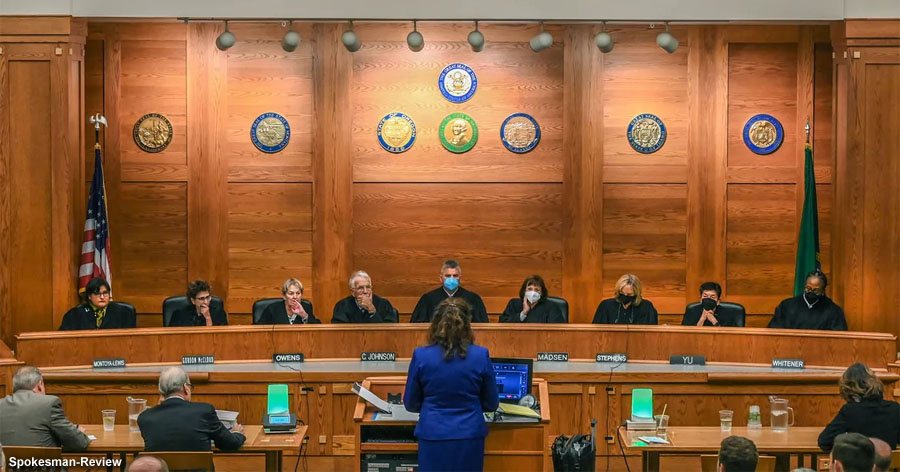NEWS ROUNDUP
4-year battle ends | Job dividends begin | UPS strike on horizon?
Tuesday, January 10, 2023
LOCAL
► From the Spokesman-Review — Spokane County’s fight with its unions over bargaining in public comes to an end — Four years after it began, Spokane County has finally lost the fight over whether union contract negotiations should be held in public or private. The state Supreme Court last month ruled unanimously that the city of Spokane could not force unions to negotiate labor contracts in public meetings. Forcing unions to negotiate in public would be illegal, the court said, because state law requires all jurisdictions to abide by uniform bargaining rules. While the Supreme Court decision specifically applied to Spokane, where 77% of voters in 2019 voted in favor of making union negotiations public, it also brought an end to the county’s disagreement with its own unions.
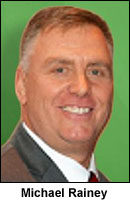 The Stand (Dec. 12, 2022) — State Supreme Court rejects Spokane ‘open bargaining’ law — Michael Rainey, President and Executive Director of the Washington State Council of County and City Employees (AFSCME, AFL-CIO):
The Stand (Dec. 12, 2022) — State Supreme Court rejects Spokane ‘open bargaining’ law — Michael Rainey, President and Executive Director of the Washington State Council of County and City Employees (AFSCME, AFL-CIO):
“During this battle for nearly two years, Spokane workers have shown up without a contract serving the people while their rights for fair wages and benefits were held hostage by an illegal ordinance. This ruling makes it clear that forcing workers to give in to unfair and arbitrary bargaining conditions is patently illegal.”
THIS WASHINGTON
► From the Spokesman-Review — After two remote sessions, Legislature opens Monday fully in person — The state House of Representatives and Senate chambers were packed Monday with legislators, family members and guests – a stark difference to last year’s near-empty chamber. Loud applause, cheers and hugs spread throughout the House chamber as members walked onto the floor for the Washington State Legislature’s first in-person session since 2020, following back-to-back sessions of mostly remote work due to the COVID-19 pandemic.
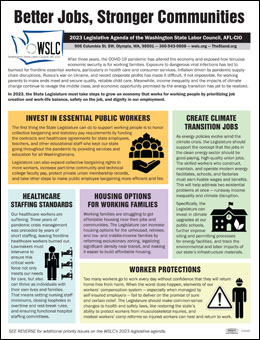 The Stand (Jan. 5) — WSLC announces 2023 agenda for state legislature — Among the legislative priorities of the Washington State Labor Council, AFL-CIO: Housing Options for Working Families. Working families are struggling to get affordable housing near their jobs and communities. The Legislature can increase housing options for the unhoused, retirees, and low- and middle-income families by reforming exclusionary zoning, legalizing significant density near transit, and making it easier to build affordable housing.
The Stand (Jan. 5) — WSLC announces 2023 agenda for state legislature — Among the legislative priorities of the Washington State Labor Council, AFL-CIO: Housing Options for Working Families. Working families are struggling to get affordable housing near their jobs and communities. The Legislature can increase housing options for the unhoused, retirees, and low- and middle-income families by reforming exclusionary zoning, legalizing significant density near transit, and making it easier to build affordable housing.
► From the Seattle Times — Why the state’s education leader says WA schools are ‘accelerating’ — Graduation rates are holding steady, enrollments are picking up and school districts are on track to spend their federal pandemic relief funds, State Superintendent Chris Reykdal said Monday.
► From The Stranger — Washington should tax the rich to save our public schools (by Robert Cruickshank) — The 2023 legislative session should be a moment where a stable Democratic majority in Olympia throws aside a flawed education funding plan from 2017, adopted as a last-minute compromise with Republicans who controlled the Senate at the time, and instead develops a better model that is entirely their own. They could adopt a system that finally, fully, and amply funds our public schools, preventing cuts and eliminating the need for PTAs to raise money to provide staff and programs. They could even do so by making our tax system less regressive.
THAT WASHINGTON
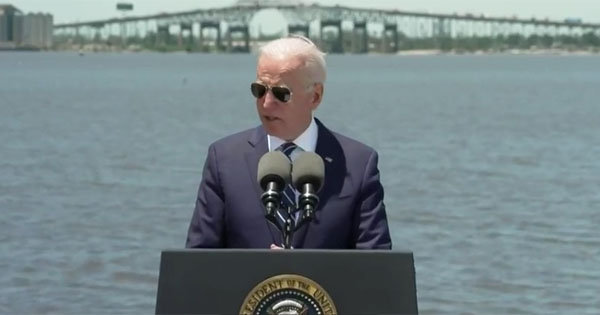
► From the NY Times — As infrastructure money lands, the job dividends begin — Archaeologists are among the workers on the leading edge of a wave of jobs that will result from $1.2 trillion in direct government spending from the 2021 Infrastructure Investment and Jobs Act. Two subsequent initiatives — $370 billion in incentives and grants for lower-emissions energy projects provided by the Inflation Reduction Act, and $53 billion in subsidies for semiconductor manufacturing funded by the CHIPS Act — are expected to leverage tens of billions more in private capital. The primary purpose of the three laws isn’t to stimulate the economy; they are mainly intended to combat climate change, rebuild infrastructure and reduce dependence on foreign semiconductors. But they will affect the labor market, including a reallocation of workers across sectors.
The Stand (Nov. 16, 2021) — A historic investment in infrastructure, jobs — Iron Workers Local 86’s Heather Kurtenbach introduces Biden at bill signing.
► From HuffPost — House adopts rules weakening Speaker Kevin McCarthy — Rules empowering the House Freedom Caucus were the price McCarthy had to pay for the speaker’s gavel.
EDITOR’S NOTE — Among other things, the new rules attempt to eliminate congressional staffers’ right to form unions, a Republican attempt to end Capitol Hill organizing weeks after a union signed its first negotiated contract.
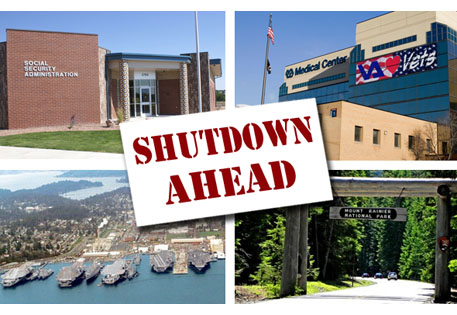 ► From The Hill — McCarthy’s concessions spur fears of potential default, government shutdown — The concessions set up showdowns this year with Senate Democrats and President Biden on the debt limit and the annual spending bills — heightening the danger of a national default or a government shutdown, political strategists say.
► From The Hill — McCarthy’s concessions spur fears of potential default, government shutdown — The concessions set up showdowns this year with Senate Democrats and President Biden on the debt limit and the annual spending bills — heightening the danger of a national default or a government shutdown, political strategists say.
► From the Washington Post — House GOP votes to slash IRS funding, targeting pursuit of tax cheats — House Republicans late Monday voted to strip roughly $71 billion from the Internal Revenue Service, targeting money Congress approved last year to help the agency find and pursue tax cheats. Vice President Kamala Harris faulted the GOP for “rushing to undo that progress (improving the country’s fiscal health) and allow too many millionaires, billionaires, and corporations to cheat the system.”
► From the Washington Post — ‘87,000 IRS agents’ is the zombie falsehood setting the House agenda
► From The Hill — CBO: Republicans’ IRS bill will add $114B to deficit
► From the AP — Feds propose ‘student loan safety net’ alongside forgiveness — The White House is moving forward with a proposal that would lower student debt payments for millions of Americans now and in the future, offering a new route to repay federal loans under far more generous terms.
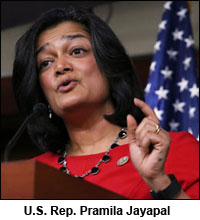 ► From Roll Call — Progressive Caucus starts year with bigger roster, focus on unity — The Congressional Progressive Caucus starts 2023 with a bigger roster, a bolder agenda and a commitment to working with both moderate Democrats and the Biden administration to fend off the GOP majority and promote workers’ rights, immigration and solutions to the climate crisis. At 103 members — nearly half of the 212-member Democratic roster — progressives are poised to wield greater influence in a closely divided chamber. Said Rep. Pramila Jayapal (D-WA), who leads the caucus:
► From Roll Call — Progressive Caucus starts year with bigger roster, focus on unity — The Congressional Progressive Caucus starts 2023 with a bigger roster, a bolder agenda and a commitment to working with both moderate Democrats and the Biden administration to fend off the GOP majority and promote workers’ rights, immigration and solutions to the climate crisis. At 103 members — nearly half of the 212-member Democratic roster — progressives are poised to wield greater influence in a closely divided chamber. Said Rep. Pramila Jayapal (D-WA), who leads the caucus:
“We can’t just be an opposition party. We’re also going to have to be a proposition party, because our goal here is to make sure we get back into the majority in 2024.”
AEROSPACE
► From the Seattle Times — Year-end surge boosts Boeing 2022 jet orders and deliveries — Following three miserable years of contraction in Boeing’s commercial airplane business, the company in 2022 took substantial steps toward a recovery, reflected in Tuesday’s release of its final jet order and delivery figures. A strong surge of 203 net orders and 69 airplane deliveries in December secured Boeing a solid year-end tally in 2022.
► From the AP — Promotions, not job cuts, follow Southwest’s holiday chaos — Southwest Airlines announced a number of executive promotions on Monday, days after announcing that last month’s service meltdown will cost the company up to $825 million, but none of the changes involved the highest ranking officers.
NATIONAL
► From the NY Times — Nurses go on strike at 2 New York City hospitals — Hundreds of striking nurses and their supporters lined both sides of Madison Avenue in front of Mount Sinai Hospital on Monday, waving signs, blowing horns and calling for a labor contract that will require more nurses at the bedside for patients. Monday’s labor action by the New York State Nurses Association, involving more than 7,000 nurses, represented the largest nursing strike in decades in New York City, and comes as nurses are increasingly turning toward walk outs as a labor strategy, both nationally and abroad.
► From the Yale News — Yale graduate students vote to form labor union — Yale graduate and professional school students have voted to form a labor union with UNITE HERE Local 33. A total of 2,039 votes were counted of 3,214 graduate and professional school students eligible to vote; 1,860 voted in favor of unionization, 179 voted against.
EDITOR’S NOTE — Ready for a voice at work? Get more information about how you can join together with co-workers and negotiate a fair return for your hard work. Or go ahead and contact a union organizer today!
► From MarketWatch — During CES, labor zoomed in on tech’s effect on workers: ‘Innovation doesn’t always have to lead to increased inequality’ — Labor leaders converged in Las Vegas last week — while the CES tech conference was going on — for a summit that centered on workers, and how technology affects them and their livelihoods.
► From The Hill — Americans divided in new poll on whether businesses should take political, social stances — The country is split on whether businesses should take public political and social stances, according to a new Gallup poll. The poll released Tuesday found 48 percent of U.S. adults said businesses should publicly state their views, while 52 percent said they shouldn’t. Pollsters found notable differences in their views based on the demographics of the respondents.
 EDITOR’S NOTE — At the heart of U.S. Supreme Court rulings in recent decades that are intended to undermine and weaken labor unions is the idea that union members shouldn’t be forced to finance political speech with which they disagree. These decisions have allowed members to “opt out” of paying dues while still retaining union benefits and representation in the name of free speech. And yet, company shareholders have no such rights. Unlike unions, which have democratic processes to vote on which candidates/causes deserve their support, corporations’ political stances are unilaterally decided by the CEO and other top corporate executives. Shareholders’ money finances corporate political stances — such as campaign contributions to election-denying candidates — but the shareholders have absolutely no voice in that decision, much less a right to avoid having their money spent that way. Discuss.
EDITOR’S NOTE — At the heart of U.S. Supreme Court rulings in recent decades that are intended to undermine and weaken labor unions is the idea that union members shouldn’t be forced to finance political speech with which they disagree. These decisions have allowed members to “opt out” of paying dues while still retaining union benefits and representation in the name of free speech. And yet, company shareholders have no such rights. Unlike unions, which have democratic processes to vote on which candidates/causes deserve their support, corporations’ political stances are unilaterally decided by the CEO and other top corporate executives. Shareholders’ money finances corporate political stances — such as campaign contributions to election-denying candidates — but the shareholders have absolutely no voice in that decision, much less a right to avoid having their money spent that way. Discuss.
► From Gallup — Nurses retain top ethics rating in U.S., but below 2020 high — Nurses continue to garner the highest ethics rating from Americans among a diverse list of professions, a distinction they have held for more than two decades. The 79% of U.S. adults who now say nurses have “very high” or “high” honesty and ethical standards is far more than any of the other 17 professions rated. Medical doctors and pharmacists rank second and third behind nurses.
EDITOR’S NOTE — Americans ranked union leaders in the middle of the pack ethically among the professions rated, behind clergy, judges and accountants, but ahead of bankers, real estate agents and lawyers. The professions ranked as having the worst ethical standards: telemarketers, members of Congress, car salespeople and… business executives.
TODAY’S MUST-READ
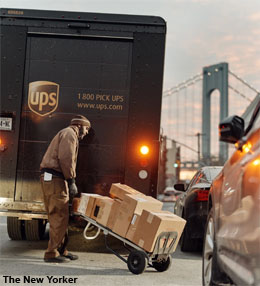 ► From the New Yorker — UPS and the package wars — Twenty-six years ago, the friendly rapport that UPS drivers had with their customers helped fuel public support for UPS’s workers when they went on strike. At the time, the Teamsters union represented 185,000 UPS workers, and their strike was the largest labor action in the U.S. in two decades. Workers stayed out on the picket line for 15 days, and, in the end, the union declared victory. Today, the Teamsters represents some 350,000 UPS workers, and the union is threatening to go on strike again when their contract expires on Aug. 1. The strike threat may seem surprising. UPS drivers have the sort of job that has become increasingly difficult to find, one that does not require a college degree but offers middle-class pay, good health-care benefits, and a pension. But, according to many drivers, the job is far more stressful and demanding than a customer might imagine: they describe being subject to extreme time pressures, constant surveillance, and the risk of injury from handling heavy packages. And, of the Teamsters working at UPS, only about 40 percent are drivers. The rest toil inside UPS buildings, mainly as part-time package handlers, for less than half the hourly wage of veteran drivers.
► From the New Yorker — UPS and the package wars — Twenty-six years ago, the friendly rapport that UPS drivers had with their customers helped fuel public support for UPS’s workers when they went on strike. At the time, the Teamsters union represented 185,000 UPS workers, and their strike was the largest labor action in the U.S. in two decades. Workers stayed out on the picket line for 15 days, and, in the end, the union declared victory. Today, the Teamsters represents some 350,000 UPS workers, and the union is threatening to go on strike again when their contract expires on Aug. 1. The strike threat may seem surprising. UPS drivers have the sort of job that has become increasingly difficult to find, one that does not require a college degree but offers middle-class pay, good health-care benefits, and a pension. But, according to many drivers, the job is far more stressful and demanding than a customer might imagine: they describe being subject to extreme time pressures, constant surveillance, and the risk of injury from handling heavy packages. And, of the Teamsters working at UPS, only about 40 percent are drivers. The rest toil inside UPS buildings, mainly as part-time package handlers, for less than half the hourly wage of veteran drivers.
The Stand posts links to Washington state and national news of interest every weekday morning by 10 a.m.

